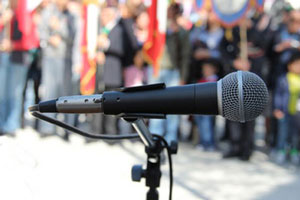Improve communication
You can wave a microphone at someone all you want but that still won't help you improve communication.
Good communication skills are essential for any sort of public speaking, but can also be very useful in day to day life. It may just make the difference between giving constructive criticism and insensitive nagging. If you want people to pay attention to you, all you need to do is follow the basic guidelines about interacting with your audience, body movement and voice control. You will find that simply being aware of these things will improve the way you speak to people or audience, and that practicing speaking as a skill will do wonders for your confidence and performance in social situations.

How to improve communication
1. Eye contact
2. Voice control
3. Conciseness
4. Assertiveness
5. Response
6. Small talk
7. Interruptions
8. Listening
9. Body language
10. Pronunciation
11. Organization
12. Perception
How To Improve Your Communication Skills and Speak So Effectively That People Will Want To Listen To You
Like anything requiring development, communication skills only get better with practice.
As mentioned before, there are several important things you need to be aware of if you would like to improve your communicative skills. With a little effort, you will soon find that it is far easier and more comfortable to speak to anyone anywhere, including speaking to bigger audiences and public presentations of any kind. So, without further ado, here are some things you should keep in mind when speaking to people:
1. Eye contact
Be it to several people or just one, maintaining eye contact while speaking is important. Of course, this does not mean you should stare, but occasionally glance in everyone's direction. If you don't engage with your audience in this way, people may start to feel like you are simply talking at them.
2. Control your voice
Have you ever noticed that some people tend to speak louder when they are excited? It's a nervous response that many people have, and it would be a good idea to learn to control it. If you are speaking to a few people or just one person in your close proximity, there is no need to raise the tone of your voice. But, in situations where you are speaking to a crowded room, or in a noisy outdoor environment, you need to project your voice so that you can be heard loud and clear in the whole area.
3. Be concise
If you want to say something and really make it stick, try to make your point in as few words as possible. Avoid rambling sentences, and avoid trailing off when you speak. It is always better to have multiple short sentences, then just a couple of really long ones. Rambling sentences make it harder for the audience to follow your train of thought, and are far less memorable than a sequence of to-the-point shorter utterances.
4. Be assertive
Assertive communication skills come naturally to some people, while others need to work at them a bit. Either way, it just takes a little practice to master this skill. It can be very useful for giving advice or constructive criticism, as it diminishes the chances that the person you are speaking to will be offended. And how exactly does one speak assertively? For a start, avoid sounding like you are attacking the person you are talking to. It is as different as saying: "I think that it could be better if you tried it like this" and "you are wrong". You may happen to be in a position where you have to speak to a person who has a hard time accepting any advice. In this case, assertiveness is the key. Try to be as polite as possible, helpful, avoid nagging, and hope for the best. Keep in mind that some people will refuse to listen or take offence no matter what or how you say it, and there is just no helping that.
5. The Correct Way to Respond
In order to show the speaker that you are paying attention, you want to convey your agreement or disagreement by adding onto yes or no. Explain your viewpoint and then pause to wait what they think about it. Having conversational skills is about patience and timing. Patience in order to carefully listen and comprehend what the speaker is saying. You have to be patient or you risk speaking out of turn and offending the speaker. Nobody likes being talked over. Treat others the way you would want to be treated. You need the correct timing or it will feel like a one-sided conversation. It is supposed to be a shared experience, even though some conversations are easier than others you need to stay pleasant through the difficult ones. Not everyone clicks with each other. Thus why it pays off to improve your listening skills: so that you can connect with a larger amount of people and increase your pool of opportunities.
6. Small Talk is More Important than You Think
There are rules of etiquette in small talking. Small talking is the basic pleasantries exchanged at the beginning of a conversation. They are basically ice breakers with no real purpose but to start a new conversation topic. Some people are born naturals at small talk and others struggle with it. But it's possible for anyone to become skilled with small talk. And if you can improve your communicating skills, you will be able to start conversations with just about anyone you meet. It is those awkward silences we fear the most when small talking that keep us on our toes. The awkward silence is not necessarily a bad thing; learn to embrace it and people will see that you don't take yourself so seriously.
7. If You Must Interrupt, Do So Politely
Interrupt in a way that lets him know you are listening. Grab onto the last word he said and make a transition into something else. Or just apologize that you have to interrupt and then make the transition. Conversation is all about transition. If you can effectively develop communication skills with smooth transitions then people will never even know that you are interrupting them to take the spotlight. If you crave attention though, people will start to catch on. So respect others and wait your turn to talk. Only interrupt when absolutely necessary. After all, what you have to say is usually not that important.
8. Stop Listening to Reply, Start Listening to Understand
Everyone has thoughts. Everyone has thoughts when there is someone else speaking. Some people can refrain from interrupting others to say what's on their mind, some can't. Some of us aren't good at remembering thoughts we want to say later, which is fine. It's not fine to always interrupt others to always say those things. By doing so you are robbing yourself of valuable information that other people are telling you. Remember that everything you say, you already know. Things that other people say, you might not already know. This is why it is so important to improve your communication techniques. Because half of communication is listening effectively. Listen to understand, not to reply.
9. Make sure you are sending the right message with your body
One of the ways to improve communication skills is to work on positive body language simultaneously. It is common knowledge that people respond well to confidence. Make sure that you aren't twitching, or staring at the floor, or flailing your hands. However, there is something to be said about good use of gestures. They can be a great way to keep your audience's attention and emphasize what you are speaking about. So make sure you are standing up straight, and in full control of your movements.
10. Pronunce words properly
Having good communication skills means having good modulation. It is extremely important to take care of how you pronounce words. It is a simple, yet one of the most effective communication techniques. People will quickly lose their interest or their patience if the speaker is mumbling, mispronouncing words, being too quiet, or hard to understand in any other way. Also, make sure to pace yourself. Speaking slowly is a good idea only when explaining something complicated, but otherwise your audience may find you boring. On the other hand, speaking too quickly may be annoying to your audience, or simply hard to follow.
11. Organize your thoughts
If you are in any sort of a public speaking arrangement, it is always a good idea to organize your speech logically. If you, for example, need to speak about something for twenty minutes, make sure that you start off with an introductory sentence, then cover all the points you need to make yourself understood, and wrap it all up by finishing off with a conclusion. If you have trouble remembering everything you need to say, you can make a small reminder for yourself, with bullet points to remind you of all the things you need to mention. Don't overdo it though; the audience will not be impressed if you simply read all your text from a paper sheet. Also, when preparing a public speech, consider the order of your presentation. Make sure that it has a logical structure, and that your audience will not have any trouble following your train of thought and understanding your points.
12. Public perception
Public perception is important, but not when it is making you nervous in everyone's eyes. Your perception should be important only when you are experienced enough to appear relaxed and interesting when you are talking.
How do you improve communication if you are shy?
Speaking to people can be a real ordeal to the people that don't have to be told how to be awkward or social shy people among us that may or may not lack the social skills to be considered easy to talk to: Especially when speaking to large groups of people. If you have a problem with this, just practice it a little at home, try to relax and follow these basic instructions, and in all likelihood, everything will turn out just fine.













